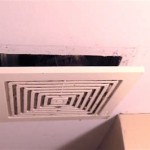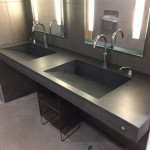How to Remove Rust Stains From Your Bathroom Sink
Rust stains in a bathroom sink are a common problem, often stemming from iron-rich water, dripping faucets, or metallic objects left in contact with the sink's surface. These unsightly stains can detract from the overall cleanliness and appearance of the bathroom. Addressing rust stains promptly and effectively is essential for maintaining the sink's integrity and preventing further discoloration. Several methods can remove rust stains, ranging from readily available household products to specialized cleaning agents. Understanding the nature of rust and the available cleaning options is crucial for choosing the most suitable and effective approach.
The removal process hinges on the severity and age of the stain, as well as the sink material. Porcelain, which is a common sink material, can be susceptible to scratching if abrasive cleaners are used. Acrylic sinks are generally more delicate and require gentler cleaning methods. Before applying any cleaning solution to the entire sink, it is advisable to test it on a small, inconspicuous area to ensure it does not damage or discolor the surface. Safety precautions are also paramount, especially when working with chemical cleaners. Wearing gloves and ensuring adequate ventilation can prevent skin irritation and respiratory problems.
Understanding the Nature of Rust
Rust, scientifically known as iron oxide, is the result of a chemical reaction between iron, oxygen, and moisture. This oxidation process weakens the iron, leading to its characteristic reddish-brown color and flaky texture. In bathroom sinks, rust stains typically arise from the gradual oxidation of iron particles present in the water supply or from metallic objects like razors, shaving cream cans, or metal fixtures that come into prolonged contact with the sink's surface.
The presence of hard water, which contains high mineral content including iron, can exacerbate rust staining. As water evaporates, the iron deposits are left behind, oxidizing over time and forming visible rust stains. Leaky faucets or plumbing fixtures also contribute significantly to rust buildup by providing a constant source of moisture that accelerates the oxidation process. Identifying and addressing the source of moisture is a vital step in preventing the recurrence of rust stains after cleaning.
The porousness of the sink material also plays a role in how easily rust stains develop and how difficult they are to remove. Porcelain sinks, for example, have a protective enamel coating, but if this coating is chipped or damaged, the underlying material becomes more vulnerable to staining. Similarly, acrylic sinks can be susceptible to scratching and staining if harsh abrasives are used. Therefore, careful consideration should be given to the cleaning method chosen based on the sink material's properties.
Household Remedies for Rust Stain Removal
Many common household items possess properties that can effectively dissolve or lift rust stains. These remedies offer a gentler approach compared to commercial cleaners, making them suitable for delicate sink materials and those seeking environmentally friendly cleaning options.
Lemon Juice and Salt: The acidity of lemon juice works to break down the rust, while the salt acts as a mild abrasive to help lift the stain. To use this method, cut a lemon in half and sprinkle salt generously over the cut surface. Rub the lemon directly onto the rust stain, applying moderate pressure. Allow the mixture to sit for approximately 15-30 minutes before rinsing thoroughly with water. This method is particularly effective for light to moderate rust stains.
Baking Soda Paste: Baking soda is a versatile cleaning agent with mild abrasive properties. When mixed with water, it forms a paste that can be applied to rust stains. To create the paste, gradually add water to baking soda until a thick consistency is achieved. Apply the paste to the rust stain and allow it to sit for several hours or overnight. Scrub gently with a non-abrasive sponge or cloth and rinse thoroughly. Baking soda is safe for most sink materials and is effective for both fresh and set-in rust stains.
White Vinegar: White vinegar is another readily available household acid that can dissolve rust. To use white vinegar, saturate a cloth or sponge with the vinegar and apply it directly to the rust stain. Allow the vinegar to sit for at least 30 minutes, or longer for more stubborn stains. For particularly difficult stains, soak a paper towel in white vinegar and place it over the stain for several hours. After soaking, scrub the area with a non-abrasive sponge and rinse thoroughly with water. White vinegar is effective for various stains and safe for most sink materials, but it should be used with caution on natural stone surfaces.
Cream of Tartar: Cream of tartar, commonly used in baking, also possesses mild abrasive and acidic properties that make it effective for rust stain removal. To use cream of tartar, mix it with a small amount of water to form a paste. Apply the paste to the rust stain and allow it to sit for approximately 10-15 minutes. Scrub gently with a non-abrasive sponge or cloth and rinse thoroughly with water. Cream of tartar is gentle enough for use on delicate sink materials.
Potato Slices: Interestingly, potatoes contain oxalic acid, which can help dissolve rust. Cut a potato in half and rub the cut surface directly onto the rust stain. You can also sprinkle some baking soda or salt on the potato slice for added abrasive power. Allow the potato juice to sit on the stain for 15-30 minutes, then scrub gently and rinse thoroughly. While this method might require a bit more effort, it's a natural and safe option for mild rust stains.
Commercial Rust Removal Products
For more stubborn or extensive rust stains, commercial rust removal products may be necessary. These products typically contain stronger acids or chemicals designed to dissolve rust quickly and effectively. However, it is essential to exercise caution when using these products and to follow the manufacturer's instructions carefully.
CLR (Calcium, Lime, Rust Remover): CLR is a popular and readily available commercial rust remover. It contains a blend of acids that dissolve mineral deposits, including rust. To use CLR, apply it directly to the rust stain and allow it to sit for the recommended time indicated on the product label. Scrub gently with a non-abrasive sponge or cloth and rinse thoroughly with water. CLR can be effective for both light and heavy rust stains, but it should be used with caution on delicate surfaces, such as natural stone.
Bar Keepers Friend: Bar Keepers Friend is a powdered cleanser containing oxalic acid, which is effective for removing rust, tarnish, and other stains. To use Bar Keepers Friend, wet the sink surface and sprinkle the powder directly onto the rust stain. Scrub gently with a non-abrasive sponge or cloth and rinse thoroughly with water. Bar Keepers Friend is safe for most sink materials, including porcelain and stainless steel, but it should be used with caution on delicate surfaces.
Toilet Bowl Cleaners (with caution): Some toilet bowl cleaners contain acids that can effectively remove rust stains from bathroom sinks. However, it is crucial to exercise extreme caution when using toilet bowl cleaners, as they can be harsh and potentially damaging to certain sink materials. Always test the cleaner on a small, inconspicuous area first and follow the manufacturer's instructions carefully. Apply the cleaner to the rust stain, allow it to sit for a short period (typically a few minutes), scrub gently, and rinse thoroughly with water. Ensure adequate ventilation when using toilet bowl cleaners, and avoid prolonged contact with skin.
Rust-Specific Cleaners: Several specialized rust removal products are specifically formulated for removing rust from various surfaces, including bathroom sinks. These products often contain a combination of acids, solvents, and surfactants that work together to dissolve and lift rust stains effectively. Follow the manufacturer's instructions carefully when using rust-specific cleaners, and ensure adequate ventilation.
Preventive Measures to Minimize Rust Staining
Preventing rust stains is significantly easier than removing them. Implementing proactive measures significantly reduces the likelihood of rust buildup and maintains the sink's pristine condition.
Address Leaks Promptly: Leaky faucets and plumbing fixtures are major contributors to rust staining. Repair any leaks immediately to prevent the constant moisture that accelerates the oxidation process.
Dry the Sink Regularly: After each use, wipe down the sink with a clean, dry cloth to remove any standing water. This simple step prevents mineral deposits from accumulating and oxidizing over time.
Avoid Leaving Metal Objects in the Sink: Razors, shaving cream cans, and other metal objects can leave rust stains if left in contact with the sink's surface. Store these items in a cabinet or on a shelf to prevent direct contact with the sink.
Install a Water Softener: If the water supply is high in iron content, consider installing a water softener to reduce the mineral content and prevent rust staining throughout the home. Water softeners can significantly improve water quality and protect plumbing fixtures from mineral buildup.
Regular Cleaning: Incorporate regular cleaning into the bathroom routine to prevent rust from accumulating. Use a mild, non-abrasive cleaner to wipe down the sink regularly, paying particular attention to areas prone to rust staining.

How To Remove Rust Stains From Toilets Tubs And Sinks

How To Remove Rust Stains From A Porcelain Tub Or Sink Cabana State Of Mind

How To Remove Rust Stains From Sink Tub Mr Handyman

How To Remove Rust Stains From A Porcelain Sink

How To Remove Rust Stains On Your Porcelain Sink

How To Remove Rust From Stainless Steel Advice Bob Vila

Here S How To Remove Rust Stains From Your Bathroom

How To Get A Clean Porcelain Sink And Remove Rust Stains Too Mom 4 Real

Ask Me Anything Rust Stains He Washer Stained Concrete More Everyday Skate

How To Get Rid Of Iron And Rust Stains Once For All Water Right
Related Posts







